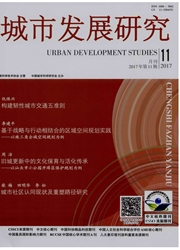

 中文摘要:
中文摘要:
在指明当前文化主导的历史街区绅士化现象正是文化消费诉求在地方的表达,符合中国转型期的时代特征这一情况的基础上,从城市发展角度,通过对文化因素作用下的国内历史街区绅士化现象的发生机制及空间影响进行分析,提出城市发展的文化需求对当前历史街区绅士化的盛行具有重要推动作用,而其动力是全球宏观背景下城市内部主体和外部竞争的文化诉求所共同作用产生的。当其作用于空间方面,则引发了历史街区空间改造模式向风貌改造的转变和表现为文化符号化、空间复制等的空间生产现象。
 英文摘要:
英文摘要:
The gentrification of historical blocks led by the current culture is the local expression of cuhural consumption aspirations, which is in line with the characteristics of China's transition. Based on the specification of the above assumption, the present paper attempts to analyze the inherent mechanism and spatial influence of the gentrification of domestic historical blocks influenced by cultural factors from the perspective of urban development. It proposes that the cultural needs for urban development have an important role in promoting the current prevalence of the gentrification of historical blocks, whose motive power is jointly generated by the cultural aspirations of the city's internal body and external competition in the global macro background. The role of gentrification in space brings about the transformation of the space model of historical blocks into the Cityscape Design, and the appearance of the space production phenomena characterized by cultural symbolization, snace cony. etc.
 同期刊论文项目
同期刊论文项目
 同项目期刊论文
同项目期刊论文
 期刊信息
期刊信息
